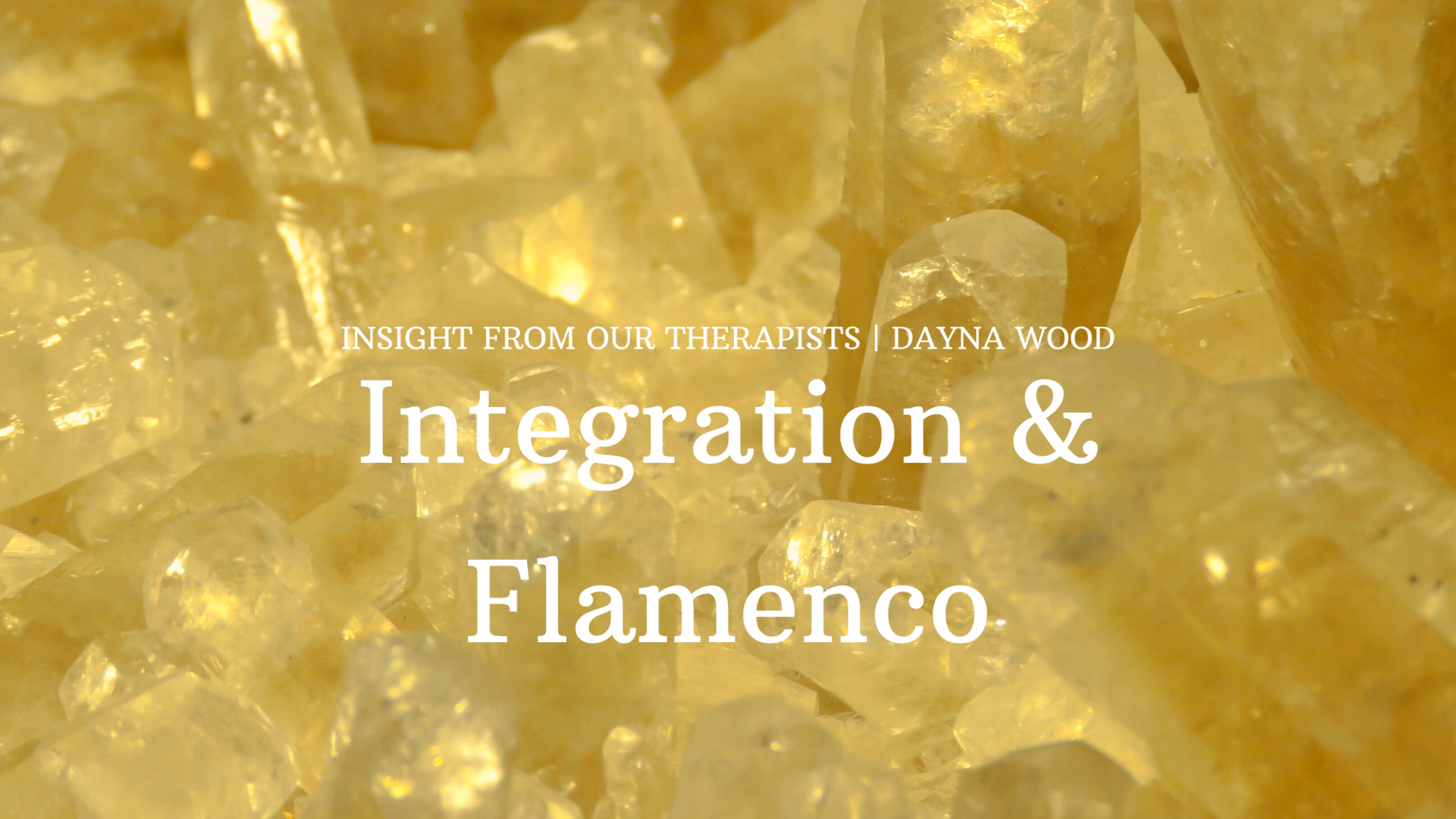Welcome to the heartbeat of Integrative Counsel, our blog where tranquility meets transformation. This is your sanctuary for insights and wisdom on nurturing a harmonious connection between mind, body, and spirit.
Integration & Flamenco

The written history of flamenco only goes back about 200 years, but there are oral accounts of flamenco that are much older. There is much debate about “what is true flamenco.” My aim is not even to attempt to answer that question, which is a very slippery slope indeed. Rather,
I would like to share with you what the spirit of flamenco means to me and why it helps explain the concept of integration.
Flamenco originated as an art form in Andalusia (southern part of Spain) as an expression of the cast-aside, the Gypsies (Gitanos), Sephardic Jews and outcast Moors. It began as song (cante) – more like a call or cry – and percussive rhythm, often a wooden cane beating in time on the floor. Only later, were the guitar and dance incorporated. Flamenco is ever-evolving and still finds itself making headlines. (Click here to read a recent example of the fluid and contrasting nature of flamenco and how it is being used as political statement.)
Flamenco is many divergent things…
and one, admittedly, includes polka dots, large skirts and dancing for tourists for money. For me, however, flamenco means not only living with, but celebrating, dichotomies. It is recognition and incorporation of many different parts, the crux of “integration.” Integrating is about bringing multiple pieces together in some sort of unified fashion – even if that “something” is in flux.
Flamenco is – no joke – about the hardest thing I’ve ever done. It kicks my butt regularly, yet I am still dedicated to being a student of its many mysteries. I know it will take a lifetime and beyond to learn, and I’ve become okay with that. I’m forced not only to think about, feel, and hear the complex rhythm (1, 2, 3, 4, 5, 6, 7, 8, 9, 10, 11, 12…) all the while moving my feet, legs, hips, arms, hands and head – optimally with duende (this is an entire other article, but roughly translated means “authenticity/spirit”). Flamenco is fiery and fierce, yet also has moments of surrender and true softness. I love that it makes fun of itself. It is first and foremost music, then movement. I come up against my many resistances while learning it. To name just a few of these inner obstacles: the “analyst” that keeps a safe distance from things that might feel uncomfortably true, the perfectionist who has a hard time letting go, the timid part that would rather stand back than take center stage, the part that is quick to judge and the one who wants to quit. But, I don’t. I keep coming back for what sometimes feels like torture. It is a genuine type of therapy for me.
I practice facing these parts, learning from them and inviting them all in.
And then there are those moments when it all comes together – left and right, light and dark, absolute freedom from thought, feeling and time, a complete surrender of my body to the invitation of the music. I’m dancing – not just the right steps, but I’ve become a part of this continual flow of the art form of Flamenco. These moments are rare and come with numbers of hours of dedication, but they happen. This is integration for me.
Sign up to receive our virtual magazine in your inbox! We send free resources, art and journal prompts, wisdom from our practitioners, and more. Click here to get on the mailing list.
Dayna Wood is the founder of Integrative Counsel; at Integrative Counsel, we offer an eclectic style of treatment that integrates the mind, body, and transpersonal. Our “special sauce” combines creative, out-of-the-box thinking with solid scientific research so our clients get the best of both worlds. Our team of experienced counselors has specialized knowledge in relationships, trauma, OCD, and other expansive therapies – aiding people in uncovering deep-rooted emotions and beliefs that remain the cause of present-day symptoms so they can experience more persistent breakthroughs. We understand that mental health is more than just its symptoms!
January 15, 2015
Click here to book a consultation call and start navigating your personal path to mental harmony with a therapist who gets you. Your journey, your pace, your story—let's unfold it together.
Let's keep the conversation going.
Feeling the spark to light up your wellness journey?
resources
CONTACT
RATES
join us
shop
SERVICES
OUR APPROACH
visiting professionals
OUR TEAM
HOME
727.342.0054
hello@integrativecounsel.com
Integrative Counsel is committed to providing culturally competent services. We respect the uniqueness of every person including, but not limited to race, ethnicity, gender identity, sexual orientation, class and religious affiliation.
